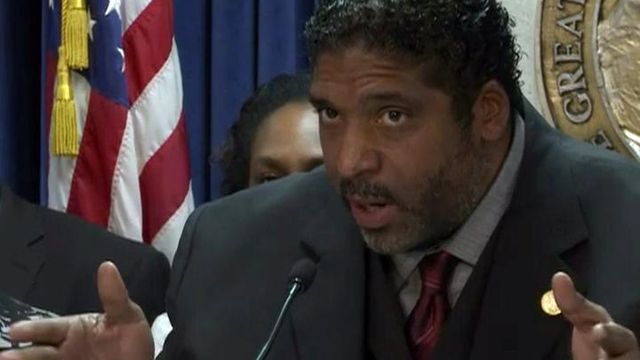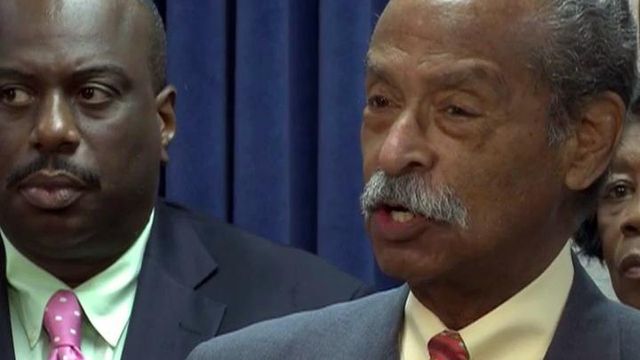Opponents plan legal challenge to voting changes
As the Senate takes up a raft of changes to North Carolina election laws on Wednesday, opponents said attorneys are already reviewing the proposal for a planned legal challenge.
Posted — UpdatedRep. Mickey Michaux, D-Durham, said the legislation runs afoul of the Voting Rights Act. Although the U.S. Supreme Court recently invalidated part of the federal law, saying it was outdated, other sections prohibiting voter discrimination remain intact.
"Voting is being emasculated in this state," Michaux said during a news conference by the Legislative Black Caucus.
He and Sen. Earline Parmon, D-Forsyth, recalled traveling across North Carolina 50 years ago to register voters, and they said they were appalled that those gains could now be stripped away.
"This is an abomination," Parmon said of the bill's impact. "It's immoral, and it's just downright wrong."
State NAACP President William Barber vowed to fight the proposal both in and outside of the courts.
"This is a battle we must fight for all North Carolinians and all Americans," Barber said during a separate news conference.
Democratic lawmakers, Barber and others argued that the bill is designed to erect barriers to voting to keep Republicans in power.
Barber recounted the history of Jim Crow practices designed to prevent blacks and poor whites from voting, and he compared House Speaker Thom Tillis and Senate President Pro Tem Phil Berger with noted segregationist politicians Strom Thurmond of South Carolina and George Wallace of Alabama.
"There is a sour stench of inequality and voter suppression in the air of the General Assembly," he said.
The legislation proposes to shorten the early voting period in general elections from 17 to 10 days, to prohibit counties from extending early voting hours on the Saturday before Election Day to accommodate crowds and to eliminate same-day voter registration during early voting.
Other provisions in the revamped bill include the following:
- Eliminate pre-registration for 16- and 17-year-olds, who currently can register to vote before they turn 18.
- Outlaw paid voter registration drives.
- Eliminate straight-ticket voting.
- Eliminate provisional voting if someone shows up at the wrong precinct.
- Prohibit counties from extending poll hours by one hour on Election Day in extraordinary circumstances, such as in response to long lines.
- Allow any registered voter of a county to challenge the eligibility of a voter rather than just a voter of the precinct in which the suspect voter is registered.
- Move the presidential primary to first Tuesday after South Carolina's primary if that state holds its primary before March 15. That would mean North Carolina would have two primaries during presidential elections.
- Study electronic filing for campaign returns.
- Increase the maximum allowed campaign contribution per election from $4,000 to $5,000.
- Loosen disclosure requirements in campaign ads paid for by independent committees.
- Repeal the publicly funded election program for appellate court judges.
- Repeal the requirement that candidates endorse ads run by their campaigns.
Anita Simha, a student at the University of North Carolina at Chapel Hill, said the proposed elections changes come on top of legislation affecting her as a woman and a student.
"With all this going on, it is hard to even consider that my representatives are working for me," Simha said. "But what scares me most is they're trying to make sure I cannot change what I don't like."
Bree Newsome, a film director and songwriter who has backed youth voting rights efforts, called the legislation "an insult to democracy."
"Voter fraud is not what shakes our confidence in government. This (bill) is what shakes our confidence in government," Newsome said. "Confidence in government will be restored when anyone who votes for it is removed from office."
Rep. Garland Pierce, the chairman of the Legislative Black Caucus, said he continues to hope that some House Republicans will refuse to agree with how the Senate "hijacked" the bill and will block its passage.
"This party has hoodwinked all of North Carolina," Pierce, D-Scotland, said of Senate Republicans.
Related Topics
Copyright 2024 by Capitol Broadcasting Company. All rights reserved. This material may not be published, broadcast, rewritten or redistributed.






